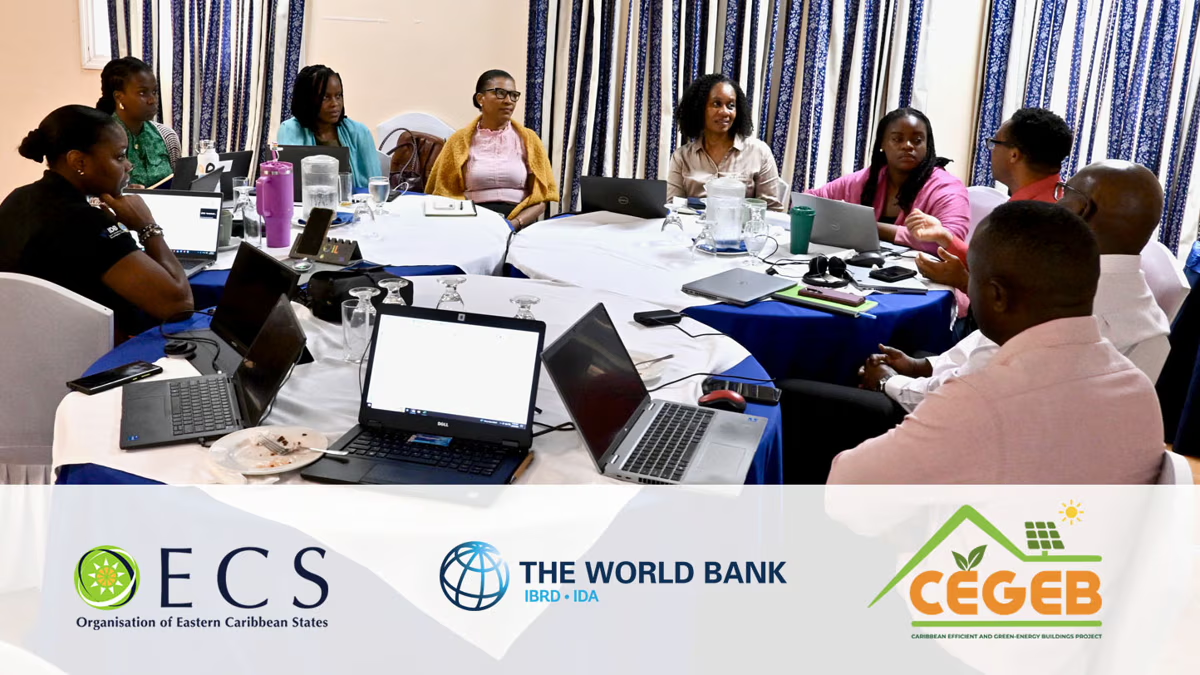Participating countries of the Caribbean Efficient and Green Buildings Project (CEGEB) met in Saint Lucia from September 24–25, 2025, to take part in a workshop that examined the lessons learned from the Preparation Activities undertaken to inform the project’s design and implementation.
The CEGEB Project is a World Bank–financed (US$131.7 million) initiative supporting Grenada, Guyana, and Saint Lucia, with the objectives of saving energy, increasing the use of renewable energy (RE) in public buildings and facilities, and enhancing the regulatory framework for investments in energy efficiency and renewable energy in participating Caribbean countries.
The OECS Commission, a partner on the project, is responsible for pooled procurement on behalf of the participating countries, drawing on its extensive experience with pooled procurement and sustainable energy. The Caribbean Centre for Renewable Energy and Energy Efficiency (CCREEE), also a project partner, is supporting the regulatory aspects of the project.
The CEGEB Project will support investment and technical assistance for Energy Efficiency (EE) retrofitting and the installation of Distributed Renewable Energy (DRE) systems in public buildings and other facilities in the three participating countries. Eligible public buildings and facilities may include central and regional administrative buildings, universities and schools, hospitals and clinics, stadiums, airports, and water supply and sewage utilities.
Under the CEGEB Preparation Grant (PPG) Activities, the OECS Commission facilitated investment-grade energy audits of 33 buildings to identify the most appropriate energy efficiency measures for each building, as well as to develop design specifications for solar systems and the energy efficiency measures.
The CEGEB PPG phase concluded on September 30, 2025, and a lessons learned workshop provided the opportunity to:
- Reflect on the successes, innovations, and challenges encountered during the CEGEB PPG;
- Document lessons learned and best practices to inform the CEGEB Project and future green building initiatives in the Caribbean and beyond;
- Facilitate knowledge exchange among stakeholders; and
- Identify pathways for sustaining project results, scaling good practices, and influencing policy for the implementation of the CEGEB Project.
The workshop was facilitated by the Project Management Office and the Monitoring and Evaluation teams of the OECS Commission. Among the key lessons identified by participants was the need for strong visibility and communication among all stakeholders and at all levels of the project. The energy retrofit of public buildings under CEGEB is seen as a clear demonstration of government leadership in reducing public sector expenditure while simultaneously improving the working environment.
Some of the energy efficiency measures identified under the project have a payback period of less than two years, demonstrating that energy efficiency retrofits in buildings are a practical and worthwhile investment. Project partners hope that the benefits and lessons from the CEGEB Project will inspire businesses and residential building owners to also adopt energy efficiency measures, helping to transform the building sector in the region into an efficient, green, and healthy one, with cross-cutting benefits.
The OECS Commission views the CEGEB Project as another key initiative that supports the OECS Decade of Action on Sustainable Energy: 2025–2035 and the broader sustainable energy transition in the Caribbean.






